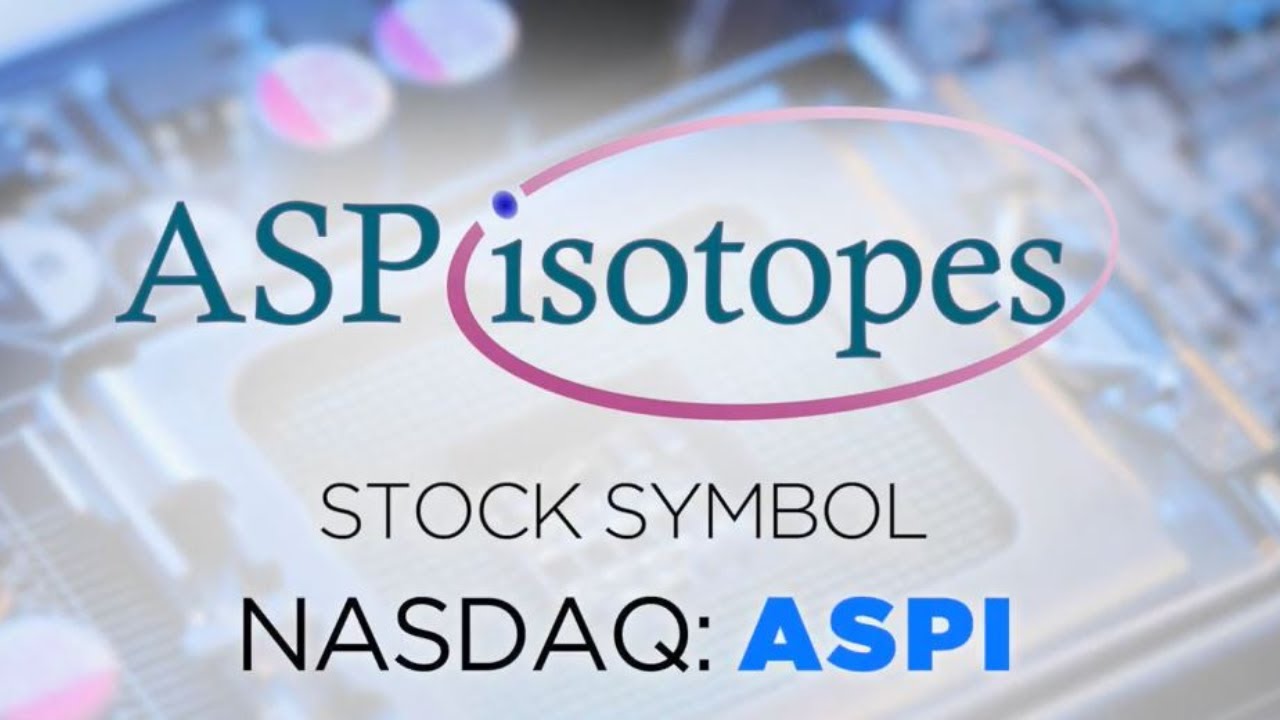Investors wanting low-priced exposure in companies that are revolutionary to their sectors should waste no time learning about ASP Isotopes, Inc. (NasdaqCM: ASPI). More and more investors are beginning to heed that advice, contributing to ASPI shares surging by over 91% since July, even accounting for some light profit-taking last Friday. That surge is earned, in part, from an announcement in June highlighting a supply contract for a highly enriched isotope for a US customer worth approximately $9 million. About 10% of that, or $900,000, is expected to hit ASPI accounts in time to accrue this quarter, followed by deliveries from ASPI during Q1 next year. (*Share price change July 1 -August 21, 2023 from $0.58-$1.11, Yahoo! Finance, 10:54 AM EST)
The deal is a milestone reached, representing ASPI’s first supply contract with a US customer. As is often the case, a foot in one door can open many others, potentially putting in play additional near-term milestones as it expands its market presence beyond its isotope production roots in South Africa. New opportunities are more likely to accrue than not. While a more detailed explanation of what an isotope is is forthcoming, know this: they are in high demand from multiple sectors. Much of that demand comes from the US market, which, like others, is looking and paying a premium for specialized isotopes that can be reliably produced and supplied.
ASPI checks those boxes. In fact, it’s precisely what this advanced materials company does. Therefore, expanding its marketing reach into US borders could steepen an already bullish trajectory. With only 37.39 million shares O/S, and about 45% of that tightly held by insiders, ASPI is doing its part operationally and from a capital perspective to support a path of least resistance for its stock to be higher.

Carbon 14- Stock Image
ASP Isotopes is Gaining Marketing Traction
The company itself appears optimistic about scoring more revenue-generating deals. They recently noted receiving considerable interest from US and non-US customers regarding its ability to supply specific isotopes required by prospective end market users in the healthcare, technology, and green energy sectors. The excellent news in that respect is that ASPI is strengthening its infrastructure with the further buildout of its facilities, which should help expedite scaling its operations. Moreover, it will allow the company to take advantage of its leading position to capitalize on the significant and growing demand for its proprietary technology and process.
For those wondering what an isotope is, here’s a quick lesson. ASPI describes isotopes as being like identical twins or triplets. They are very similar in most aspects, except for a few subtle differences. From a scientific definition, isotopes are two or more atoms of the same chemical element with the same number of protons and electrons but slightly different numbers of neutrons. They are mixed together in nature, just like M&M chocolate candies: same composition, taste, and size – just different colors. Needing to be sorted, the isotope separation process puts them into fractions of precisely the same types. As one would expect, it is a very challenging and expensive process because isotopes are so similar, with only minor weight differences being the distinguishing factor.
ASPI is up for the challenge, leveraging two decades of experience as an advanced materials company to develop technology and processes to produce isotopes for multiple industries. That’s made possible by the proprietary technology empowering its Aerodynamic Separation Process (“ASP technology”), contributing to successful production, distribution, marketing, and sale of the ready-for-client isotopes. As noted, ASPI’s work is highly specialized and client-specific, currently targeting revenue-generating opportunities from producing and commercializing highly enriched isotopes for the healthcare and technology industries. While those are the current markets in play, ASPI plans to capitalize on additional market potentials, including those from the green energy sector, with all opportunities served from its two isotope enrichment facilities in Pretoria, South Africa. One facility is dedicated to enrichment isotopes of elements with a low atomic mass (light isotopes), leading toward the initial production of Carbon-14.
The second, larger facility will focus attention on producing multiple different isotopes to meet growing client demand for isotopes like Silicon-28, which can enable quantum computing. Additional in-demand isotopes include Molybdenum-100, Molybdenum-98, Zinc-68, Ytterbium-176, and Nickel-64 for new, emerging healthcare applications. To monetize its green energy interests, ASPI plans to produce Chlorine-37, Lithium-6, and Uranium-235 for applications relevant to that sector. Meeting this diverse demand is no coincidence. It’s an intentional result of ASPI’s ASP Technology, proven ideal for enriching low and heavy atomic mass molecules. Both plants are expected to enter commercial production from late 2023 to early 2024, which should drive considerable free cash flow.

A Niche Billion Dollar Opportunity
That specialty is more than a difference; it’s an advantage that allows them to effectively compete for the lion’s share of an estimated market opportunity reaching the billions. That includes the demand from the target markets mentioned, as well as new ones inherent to its plans to serve isotope needs in the Nuclear Medicine and Green Nuclear Energy space. Not only is ASPI well-positioned to reach those markets, but they are also prepared to do so efficiently.
ASPI’s innovative isotope enrichment technology is cost-effective, has modular scalability, and is environmentally friendly and unique compared to competing separation facilities. Also notable is that its isotope enrichment plants utilize natural isotopes and accelerator-based production, generating zero overall waste. That’s not all.
Timeliness to help maintain world supply is another key value driver. Recent geopolitical events have made governments and companies reassess their reliance on Russia to produce isotopes. Russia’s production share of the global medical isotope market is 22%, and China and Russia together comprised 57% of the world’s Uranium Enrichment capacity in 2020. Reliance on those suppliers could soon become more pronounced, considering 8 of the world’s 9 major reactors producing medical isotopes are expected to shutter over the next 15 years, adding to an already wide gap in global supply for Mo-99 and other isotopes.
With this in mind, ASPI may already be benefiting from the scramble to secure supply. An update indicated securing at least two more supply agreements for crucial isotopes could be in its queue. That’s excellent news, as further revenue streams will help push ASPI closer to positive cash flow. There is longer-term guidance as well, with ASPI expecting to sign additional supply contracts for other isotopes from 2025-2028, supported by planned facility builds and upgrades. In addition to the two mentioned, a third enrichment facility could be completed by the end of 2024. That one is being designed with enhanced energy-saving integrations to facilitate revenues falling faster to its bottom line.
Keep in mind that demand is real and growing. Carbon-14 is already serving user demand in the pharma and agro-chem sectors. Additionally, two Molybdenum isotopes will be available in late 2023 for nuclear medicine, adding to the value from its silicon-28, under construction for quantum computing uses. Isotopes in ASPI’s research and development pipeline include variants of Germanium, Ytterbium, Nickel, Xenon, Chlorine, Lithium, Zinc, and Uranium. All show tremendous potential to exploit diverse revenue-generating opportunities.
Near-Term Initiatives Provide Long-Term Revenue Vision
Investors should also know that ASPI could benefit from a thin competitive landscape. That advantage was secured as a result of the company doing things differently. Conventional methods for isotope separation, such as gas centrifugation, can be costly, often requiring substantial capital investment. In contrast, ASPI’s separation process utilizes a stationary cylinder wall while gas spins rapidly due to pressure application and flow directors. The absence of moving metal components leads to reduced expenses and simpler operations. It also mitigates excess capital expenditures and lessens maintenance costs.
That’s a key differentiator that could bring excellent news as ASPI moves through 2023, supporting its main current Carbon-14 isotopes to drop more value to the bottom line from already in-place multi-year supply agreements expected to generate upwards of $2.5M. Other potential applications for Carbon-14 could satisfy clients in the science space, appealing to them because of its relatively harmless emission and long-lasting half-life. ASPI plans to begin commercial Carbon-14 production by the end of this year. The company’s other targeted isotope markets are also sizable; for example, the SPECT scan imaging Global Market Size is $4.61B. That figure could grow further as specialized isotopes pave the way for new, inventive uses.
Geopolitical tailwinds support developing alternative supply, addressing concerns that 95-98% of Molybdenum-99 is produced using highly enriched uranium targets. Couple that with those 8 of the world’s 9 major reactors retiring in the next 15 years, and ASPI is again in the sweet spot of seizing its opportunities. There are still more value drivers supporting the value proposition.
Leveraging Technology to Fill Supply Gaps and Threats
A concern needing to be met head-on is the United States’ reliance on imports for 95% of its uranium and 81% of its enrichment from foreign sources. That comes at a time when other countries are focusing on raising nuclear power capabilities. For instance, the UK aims to expand nuclear power from 15% to 25% by constructing 8 new plants by 2050. India and France have plans to build 10 and 6 new reactors, respectively, and Japan aims to produce 20-22% of its electricity from nuclear sources by 2030. China currently has 38 operational reactors and 19 under construction, with further plans to produce 70 GW of power by 2025.
Those figures indicate growing concern has indeed led countries to plan new solutions. The elephant in the room is Russia, which contributes 35% of the world’s enriched uranium. The disconnect between their ability to supply and the United States’ need to import is a significant threat to specific US ambitions and, more so, to national security.
Fortunately, ASPI can help. Its proven proprietary technology and research to enhance isotopes of varying atomic masses enable versatile isotope production for multiple sectors and applications. Furthermore, geopolitical factors and favorable market conditions support rapid expansion driven by an urgent need for reliable isotope sources. With ASPI’s operational performance and two enrichment facilities near completion with a third to follow, they are ideally positioned to help address a global need. Therefore, a revenue ramp could be on the horizon, starting in late 2023 and continuing throughout 2024.
All told, ASPI looks better positioned than ever to have a breakout growth starting this quarter. The company has the right pieces in place, including revenue-generating deals that highlight to others its robust and adaptable suite of isotope enrichment technologies. That portfolio will enable ASPI to serve the increasing demand and, as importantly, mitigate potential supply shortages and reliance on sometimes hostile trading partners. Thus, despite ASPI shares surging 91% since July, at $1.11 on Monday, a considerable disconnect between intrinsic value, inherent potential, and share price remains – exposing a glaring window of opportunity. With seven-figure deals accruing, additional agreements in the queue, a low O/S structure, and facilities about to come online, the best consideration may be to take advantage before it closes.
Disclaimers: Shore Thing Media, LLC. (STM) is responsible for the production and distribution of this content. STM is not operated by a licensed broker, a dealer, or a registered investment adviser. It should be expressly understood that under no circumstances does any information published herein represent a recommendation to buy or sell a security. Our reports/releases are a commercial advertisement and are for general information purposes ONLY. We are engaged in the business of marketing and advertising companies for monetary compensation. Never invest in any stock featured on our site or emails unless you can afford to lose your entire investment. The information made available by STM is not intended to be, nor does it constitute, investment advice or recommendations. The contributors may buy and sell securities before and after any particular article, report and publication. In no event shall STM be liable to any member, guest or third party for any damages of any kind arising out of the use of any content or other material published or made available by STM, including, without limitation, any investment losses, lost profits, lost opportunity, special, incidental, indirect, consequential or punitive damages. Past performance is a poor indicator of future performance. The information in this video, article, and in its related newsletters, is not intended to be, nor does it constitute, investment advice or recommendations. STM strongly urges you conduct a complete and independent investigation of the respective companies and consideration of all pertinent risks. Readers are advised to review SEC periodic reports: Forms 10-Q, 10K, Form 8-K, insider reports, Forms 3, 4, 5 Schedule 13D. For some content, STM, its authors, contributors, or its agents, may be compensated for preparing research, video graphics, and editorial content. Shore Thing Media, LLC. has been compensated up to three-thousand-five-hundred-dollars cash via wire transfer by a third party to produce and syndicate content for ASP Isotopes Inc. for a period oftwo weeks ending on September 2, 2023. As part of that content, readers, subscribers, and website viewers, are expected to read the full disclaimers and financial disclosures statement that can be found on our website. Contributors reserve the right, but are not obligated to, submit articles for fact-checking prior to publication. Contributors are under no obligation to accept revisions when not factually supported. Furthermore, because contributors are compensated, readers and viewers of this content should always assume that content provided shows only the positive side of companies, and rarely, if ever, highlights the risks associated with investment. Thus, readers and viewers should accept the content as an advertorial that highlights only the best features of a company. Never take opinion, articles presented, or content provided as a sole reason to invest in any featured company. Investors must always perform their own due diligence prior to investing in any publicly traded company and understand the risks involved, including losing their entire investment. The Private Securities Litigation Reform Act of 1995 provides investors a safe harbor in regard to forward-looking statements. Any statements that express or involve discussions with respect to predictions, expectations, beliefs, plans, projections, objectives, goals, assumptions or future events or performance are not statements of historical fact may be forward looking statements. Forward looking statements are based on expectations, estimates, and projections at the time the statements are made that involve a number of risks and uncertainties which could cause actual results or events to differ materially from those presently anticipated. Forward looking statements in this action may be identified through use of words such as projects, foresee, expects, will, anticipates, estimates, believes, understands, or that by statements indicating certain actions & quote; may, could, or might occur. Understand there is no guarantee past performance will be indicative of future results. Investing in micro-cap and growth securities is highly speculative and carries an extremely high degree of risk. It is possible that an investors investment may be lost or impaired due to the speculative nature of the companies profiled.
Media Contact
Company Name: STM, LLC.
Contact Person: Michael Thomas
Email: contact@primetimeprofiles.com
Country: United States
Website: https://primetimeprofiles.com/

